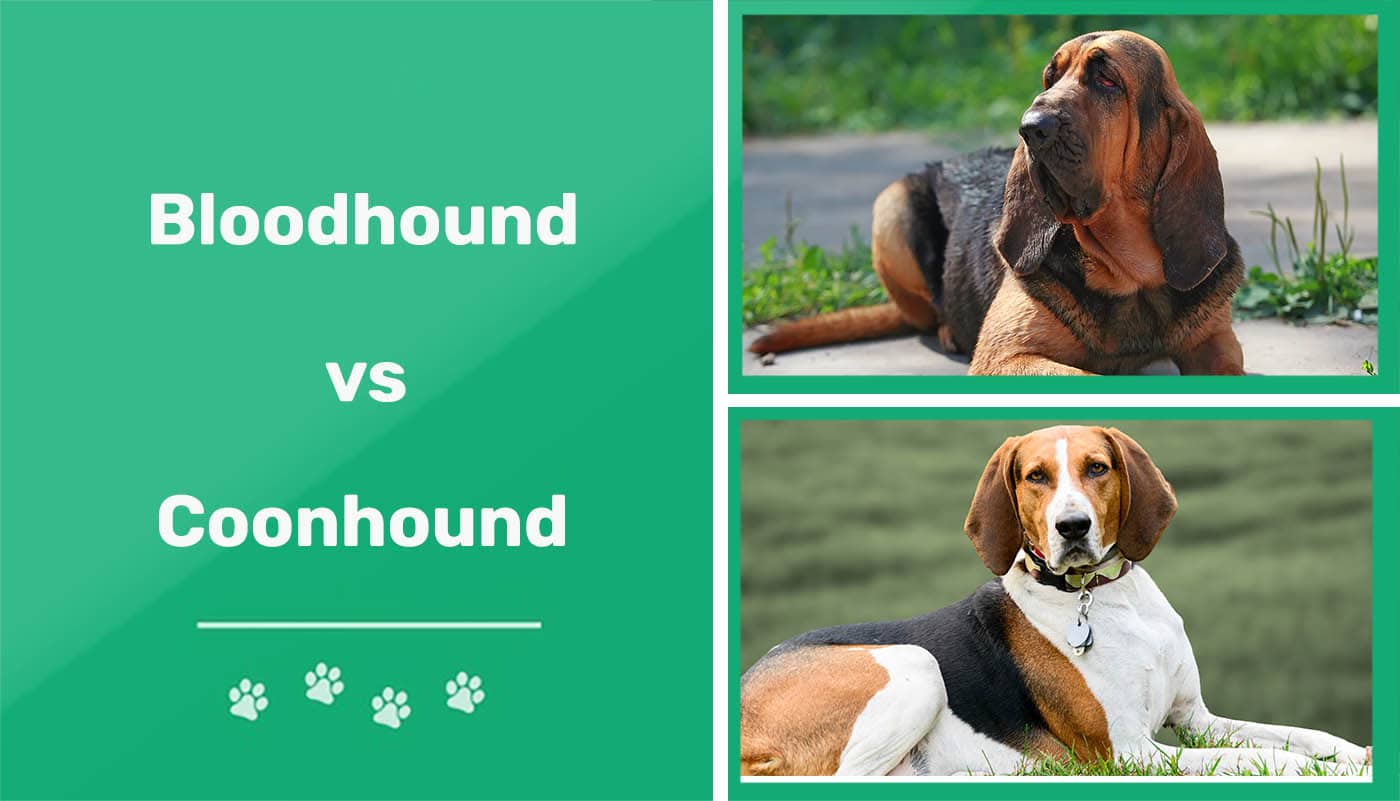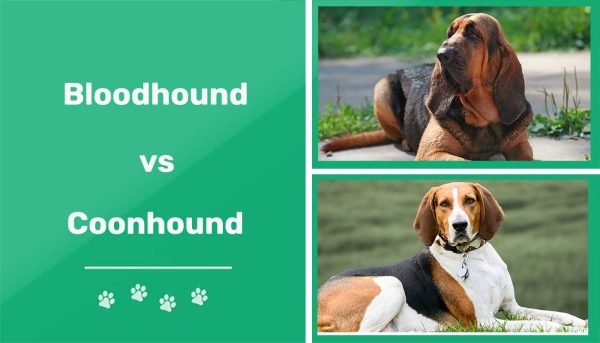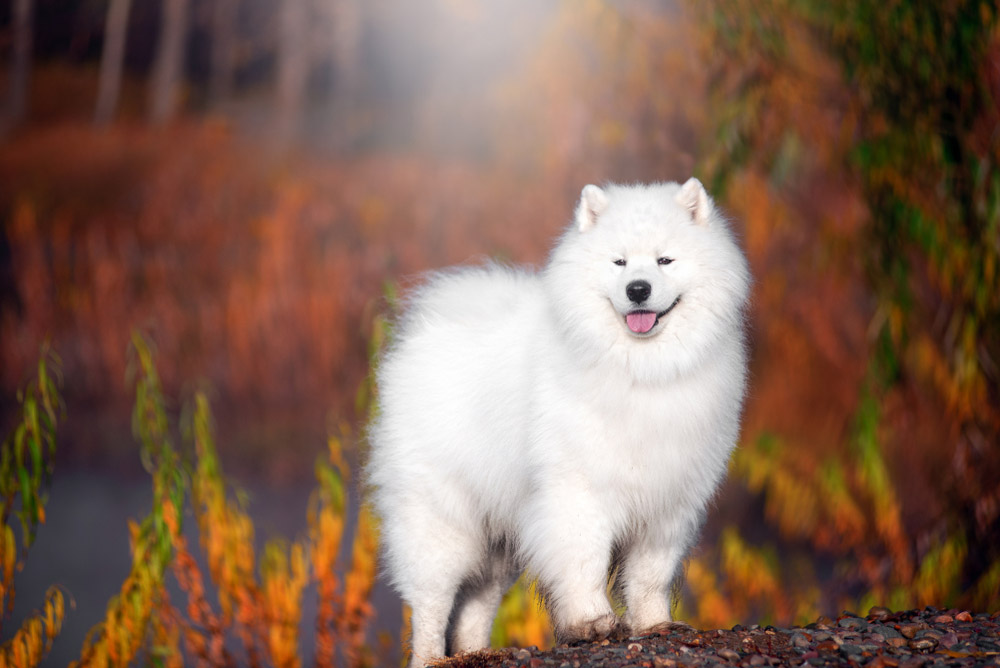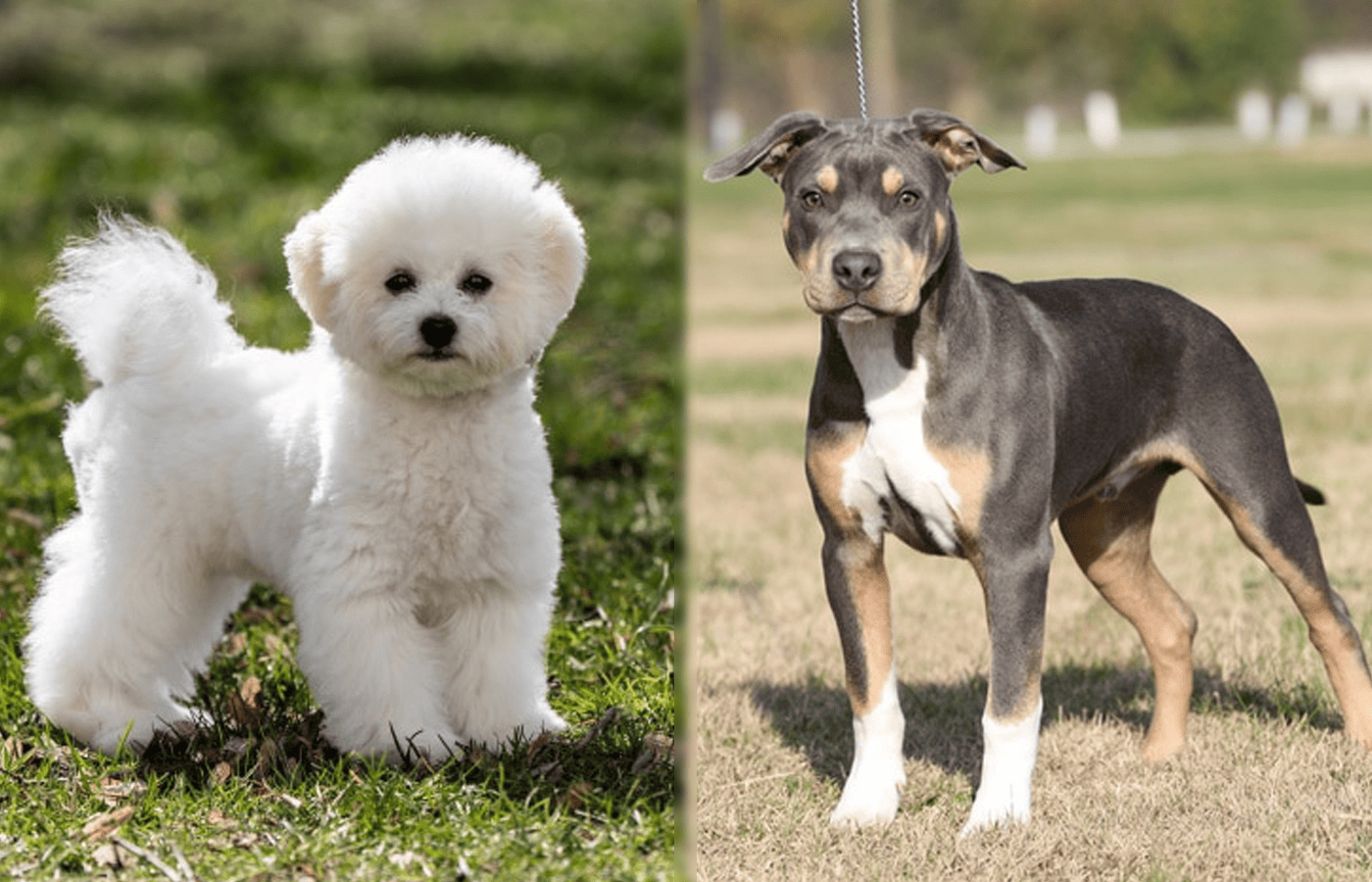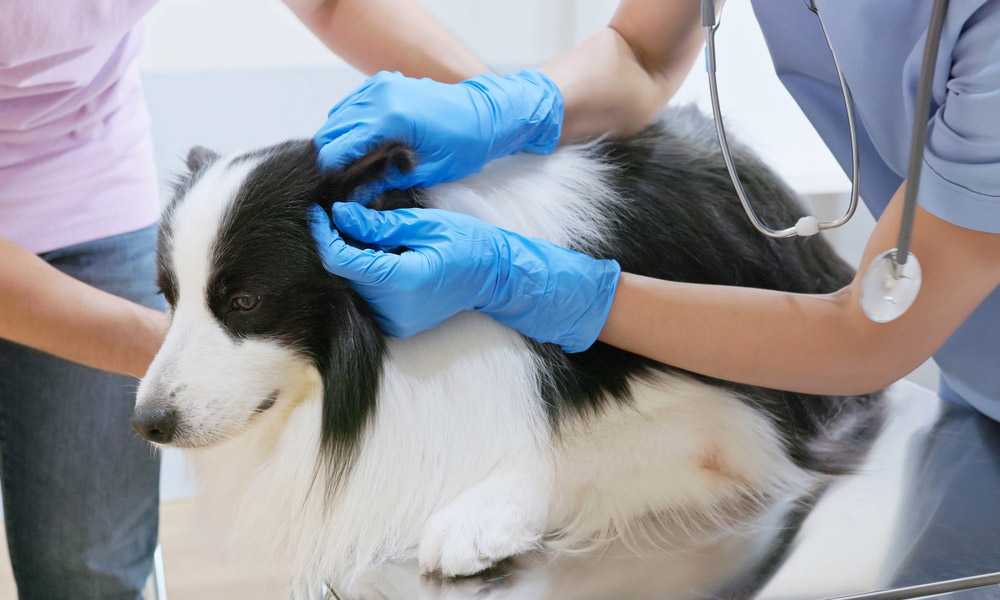Click to Skip Ahead
Hunting dogs are extremely popular. In areas where outdoor culture is strong, hunting dogs regularly rank in the top five for most popular dogs in a state or particular region. Many people enjoy hunting dogs due to their intelligence, trainability, and loyalty.
Two of the most iconic hunting dogs are Bloodhounds and American English Coonhounds (or Coonhound for short). Many people think that hunting dogs are all similar, but that is not necessarily the case. Dogs like the Bloodhound and the Coonhound are incredibly different from one another. While many of these dogs are driven and intelligent, they come with deep personality and physical differences.
Here is everything you need to know about the Bloodhound and the American English Coonhound, including their characteristics, trainability, grooming needs, and more.
Visual Differences
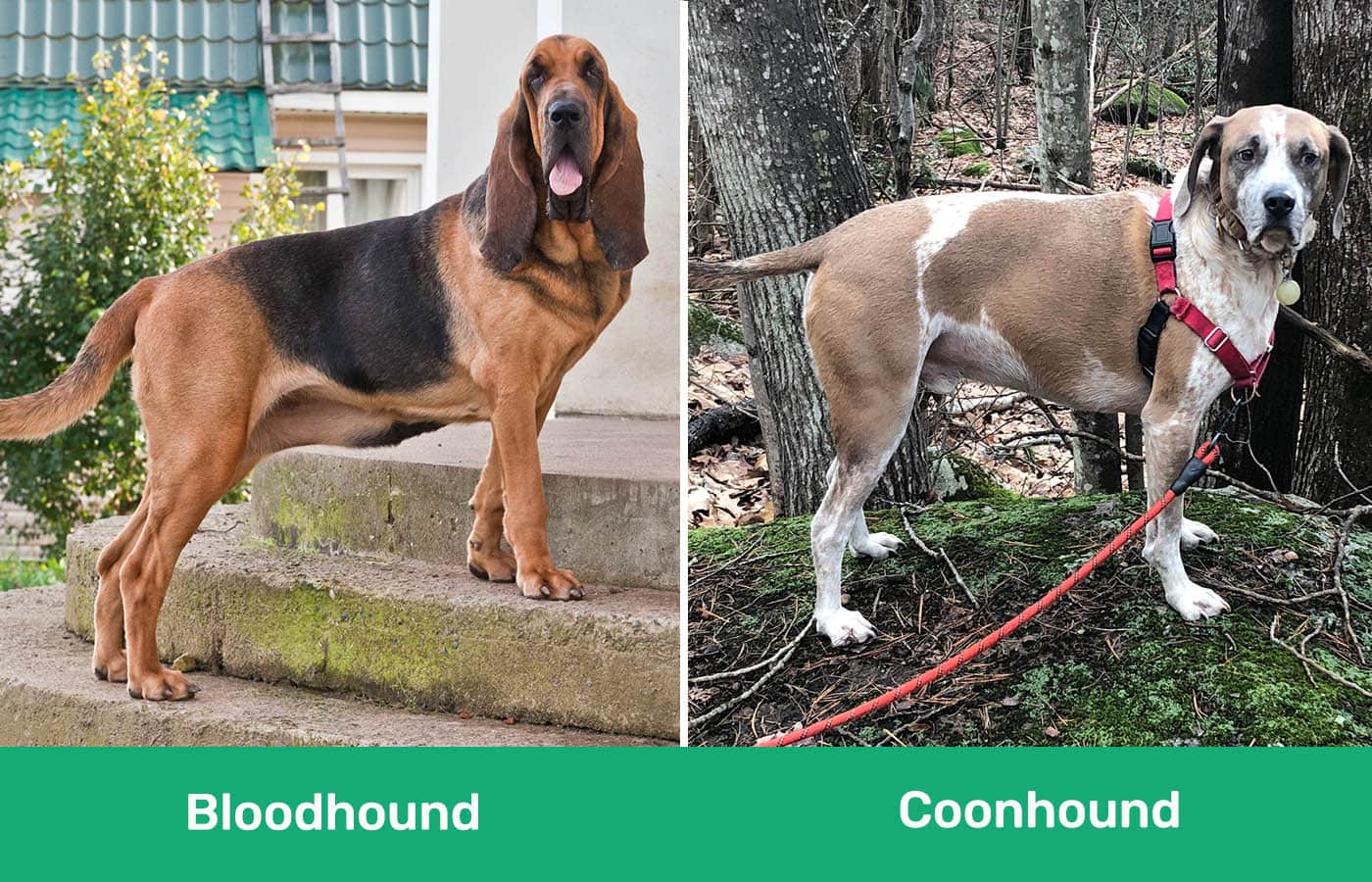
At a Glance
- Average height (adult): 23–27 inches
- Average weight (adult): 80–110 pounds
- Lifespan: 10–12 years
- Exercise: 1–2 hours per day
- Grooming needs: Moderate
- Family-friendly: Yes
- Other pet-friendly: Usually
- Trainability: Working dog that excels with a job, can be stubborn if on a scent
- Average height (adult): 23–26 inches
- Average weight (adult): 45–65 pounds
- Lifespan: 11–13 years
- Exercise: 2+ hours a day
- Grooming needs: Slight
- Family-friendly: Often
- Other pet-friendly: Yes
- Trainability: Highly energetic, needs socialization and regular exercise
Bloodhound Overview
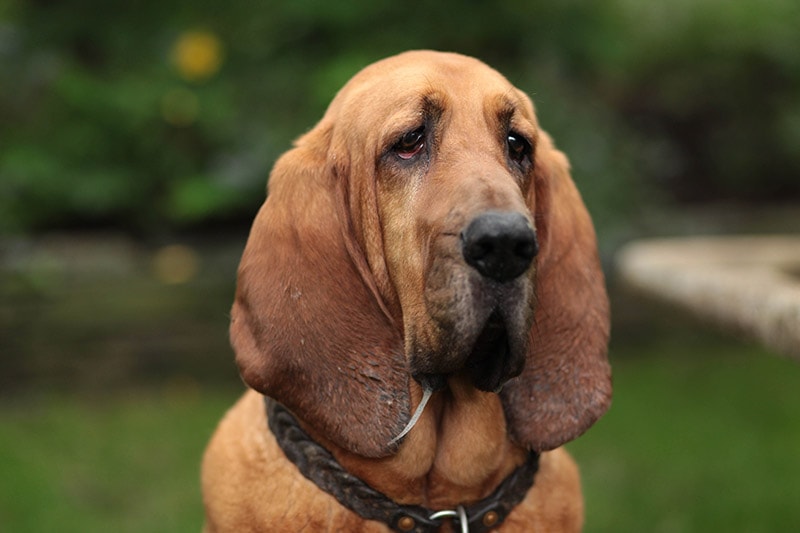
Bloodhounds have gained the reputation of being lazy southern dogs, but there is so much more to them than that. In fact, Bloodhounds are very energetic, intelligent, and love having a job. Bloodhounds have some of the best noses in the animal kingdom. They love sniffing out unique smells and will track down the source of an odor for miles if necessary. Despite their origins as hunting dogs, Bloodhounds can be very loving family dogs in the right situation.
Personality
Young Bloodhounds and Bloodhounds that work a lot are very active and alert. These types of Bloodhounds are always looking to get outside and explore using their noses. As they age, Bloodhounds mellow out, but they never lose their love of sniffing and tracking. Bloodhounds are very loyal to their owners and can be snuggly and lovey. Bloodhounds are often good with other dogs, but not always. They can be protective and obsessive with other dogs on occasion.
Training
Bloodhounds can be active and stubborn, meaning that they need firm and consistent training if you are going to bring them out on long walks, out into nature, or let them roam around in the yard without strict supervision. When on a scent, Bloodhounds can be hard to control and will not want to listen or go home. Active training when a Bloodhound is young, paired with socialization, is recommended for all Bloodhounds.
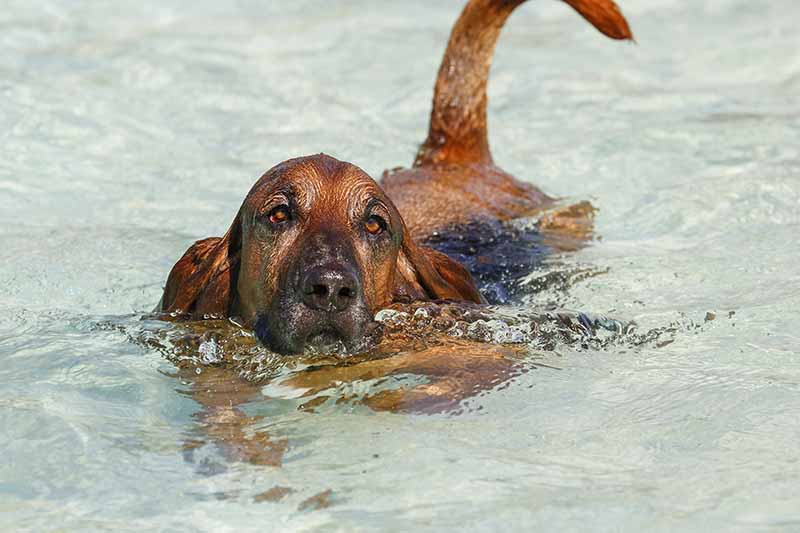
Exercise
Many people think that Bloodhounds are lazy, but that is far from the truth. Bloodhounds will need two long walks per day to get their energy out. It is recommended to budget 2 hours per day for exercise for Bloodhounds. This exercise does not need to be high-intensity. Bloodhounds enjoy time to roam around and time on the leash.
Health
Bloodhounds are relatively healthy dogs. They have a few health concerns to be aware of. First, Bloodhounds are considered deep-chested dogs, and therefore, they are susceptible to bloat. Bloat can be a life-threatening condition. Consult your veterinarian about the risk of bloat in your Bloodhound and learn the signs so you can react accordingly.
Other health conditions that are common in Bloodhounds include intestinal blockage due to eating foreign objects and ear infections due to their droopy ears. Bloodhounds can have the bad habit of eating things they shouldn’t, and that is something that needs to be closely monitored. Their ears also tend to trap things like dirt, sweat, and dust inside them, which can lead to a higher rate of infection than other dogs.
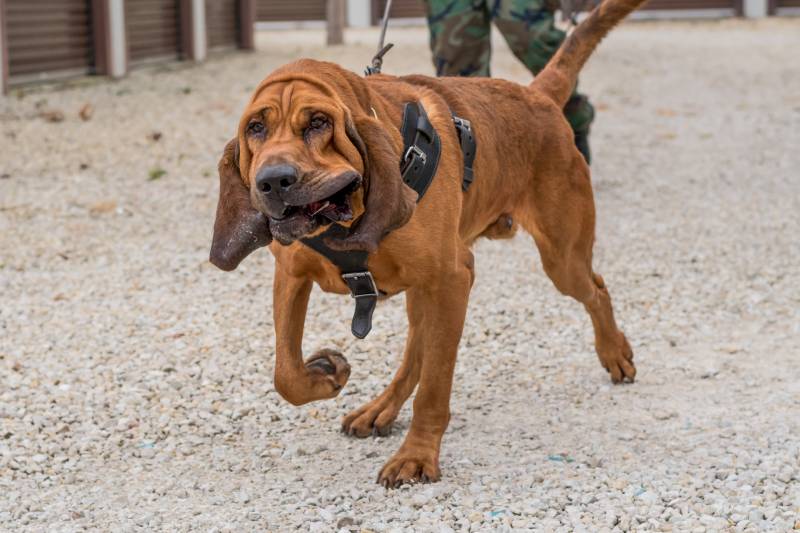
Grooming
Bloodhounds have a thick wiry coat that sheds twice a year on average. Bloodhounds will require weekly brushing to keep their coat thin and healthy. They will also require regular baths if they spend a lot of time outside. Their grooming needs are considered to be moderate due to the regular attention they require.
Suitable For:
Bloodhounds are suitable for hunters, people who love spending time outside, and families with the ability to give them the walks and grooming that they need. Bloodhounds can be excellent family dogs if they are trained properly and managed. Bloodhounds will often try to escape their yards if they find a good scent to track and that is something that any family needs to consider before getting a Bloodhound of their own.
Coonhound Overview
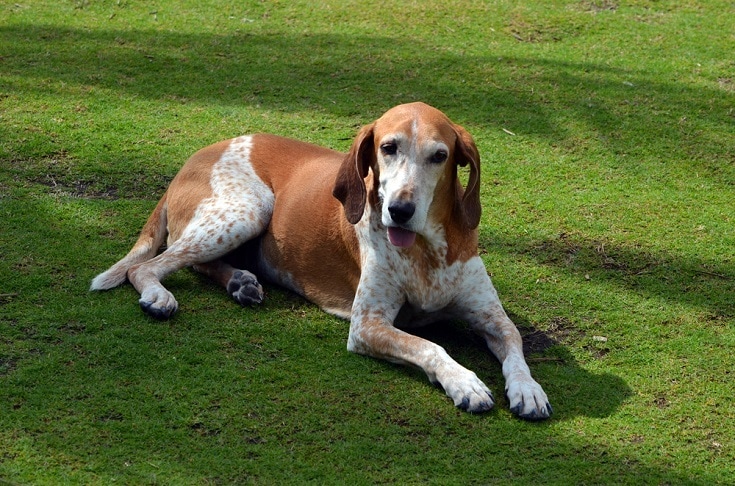
American English Coonhounds are handsome dogs with a rustic feel. These dogs used to be commonplace and were seen prowling through the woods during the night in search of their prey, which is primarily raccoons. As backwoods hunting has fallen out of favor in the face of more corporate hunting (bagging deer rather than looking for squirrels or raccoons), so has the popularity of the Coonhound dipped. The American English Coonhound ranked just 178 out of 200 breeds in the latest American Kennel Club survey. By comparison, Bloodhounds ranked 53 out of 200. Still, Coonhounds can be excellent dogs for those who are curious, and they still remain popular in certain regions.
Personality
The American Kennel Club describes American English Coonhounds as having split personalities. When they are outside on a long walk or a hunt, they are tireless and determined to the point of stubbornness or disobedience. At home, Coonhounds are known for being sweet as pie, loyal, and cuddly. If you decide to get a Coonhound, you will have to deal with both parts of their personalities.
Training
Due to their active nature and stubborn tendencies, Coonhounds need a lot of training. Firm and consistent training coupled with beneficial socialization is necessary to get a well-heeled dog. Coonhounds innately want to join a pack, and when they are in a pack, they can be difficult to control. Your Coonhound will either decide to create a pack with the people in the house or with other dogs. When in a pack environment, these dogs will lose their affectionate side and can be nippy or protective of resources like food, which is important for potential owners to realize.
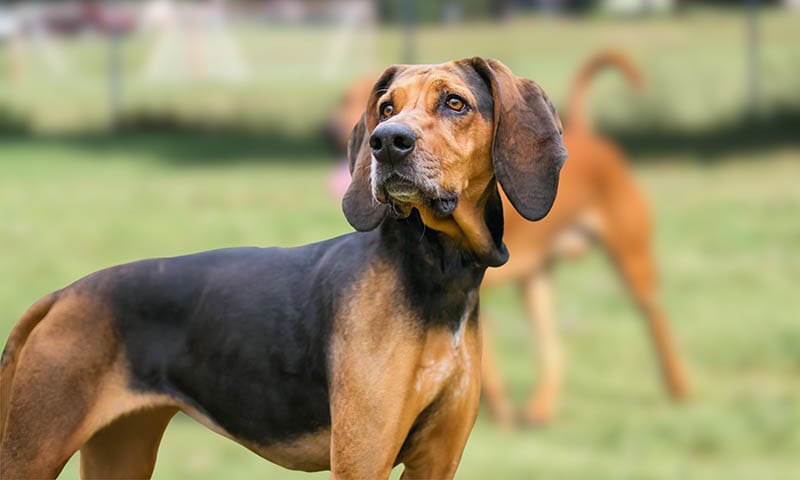
Exercise
American English Coonhounds require a lot of exercise. Unlike Bloodhounds, Coonhounds require high-intensity exercise. You should budget at least 2 hours of intense exercise for your Coonhound per day. That means sustained running or bursts of sprinting.
Health
American English Coonhounds are considered to be healthy dogs. Responsible and knowledgeable breeders can screen out most health issues before they become a problem. Like Bloodhounds, Coonhounds are deep-chested and have the chance to experience bloat. They also need their ears cleaned and checked for debris to prevent infections.
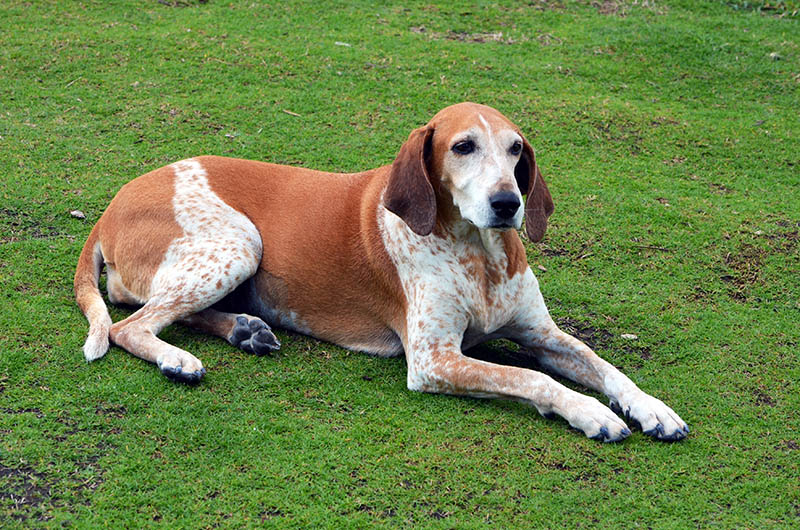
Grooming
Coonhounds have what is called a hard coat which means that it is brittle and requires very little upkeep. Healthy Coonhounds do not need anything in the way of serious grooming. Like any dog, they will benefit from occasional brushing and baths to keep them looking and smelling their best, but they don’t need regular brushing or coat treatments to remain healthy.
Suitable For:
Coonhounds are suitable for young, active couples who will run, bike, or hike with their dog regularly. They’re great for small families that are experienced in owning dogs that can be possessive or stubborn. Hunters who are looking for a companion with a lot of speed and endurance to keep up with you on the trail are also great owners for Coonhounds.
FAQs
Are Bloodhounds or Coonhounds Better for Families?
Bloodhounds are generally considered to be better family dogs than Coonhounds. Coonhounds can be stubborn, protective, active, and possessive, which can make them iffy around children. Coonhounds also need a lot of high-intensity exercise that families might not be able to provide regularly. Coonhounds do get along better with other dogs than Bloodhounds and form deep friendships with their canine companions. However, Bloodhounds are better with kids and are generally chiller and easier to handle overall.
Can Bloodhounds and Coonhounds Be House Dogs?
Yes. In the right circumstances, both Bloodhounds and Coonhounds can be exceptional house dogs. Knowledge, training, and a plan are needed to manage both Bloodhounds and Coonhounds in a house setting. But both dogs can do very well inside with their people.
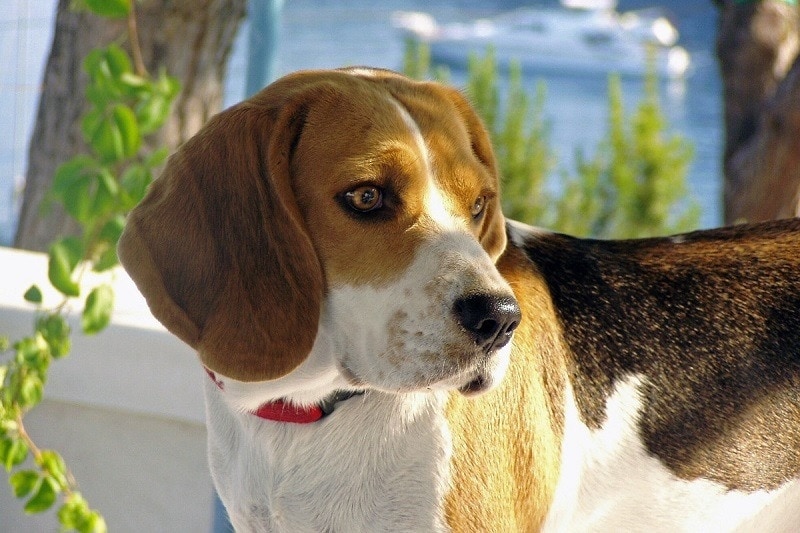
Are Bloodhounds or Coonhounds More Expensive?
Both Bloodhounds and American English Coonhounds can be found for a similar price. Bloodhounds typically range between $500 and $1,200 for a puppy. American English Coonhounds range between $800 and $1,200. These prices can vary by region and breeder. On the upper end, both of these dogs are very similar in price. On the lower end, Bloodhounds are slightly more affordable.
Bloodhounds are much larger dogs than Coonhounds which means that they eat more. The largest Bloodhounds can weigh between 100 and 120 pounds. That means they will eat considerably more than a Coonhound. That can add up over the life of the dog, making Bloodhounds more expensive to upkeep over time.
What Do American English Coonhounds Hunt?
The American English Coonhound was trained to hunt two specific animals. During the day, the Coonhound was trained to hunt red foxes. Fox hunting is incredibly popular in places like England. At night, Coonhounds were trained to hunt raccoons, hence the name Coonhound. Today, Coonhounds rarely hunt raccoons as raccoon hunting is no longer as popular as it once was. However, these dogs can still be trained to hunt small wily game like opossums, raccoons, and foxes.
What Do Bloodhounds Hunt?
Bloodhounds were originally bred to hunt large game such as elk, deer, and wild boar. However, Bloodhounds are excellent tracking dogs and can be trained to track nearly any scent. Bloodhounds can track animals as small as rabbits or things as complicated as missing persons or escaped convicts. Bloodhounds are incredibly versatile hunting dogs that do their best work when they are on a job tracking a specific scent.
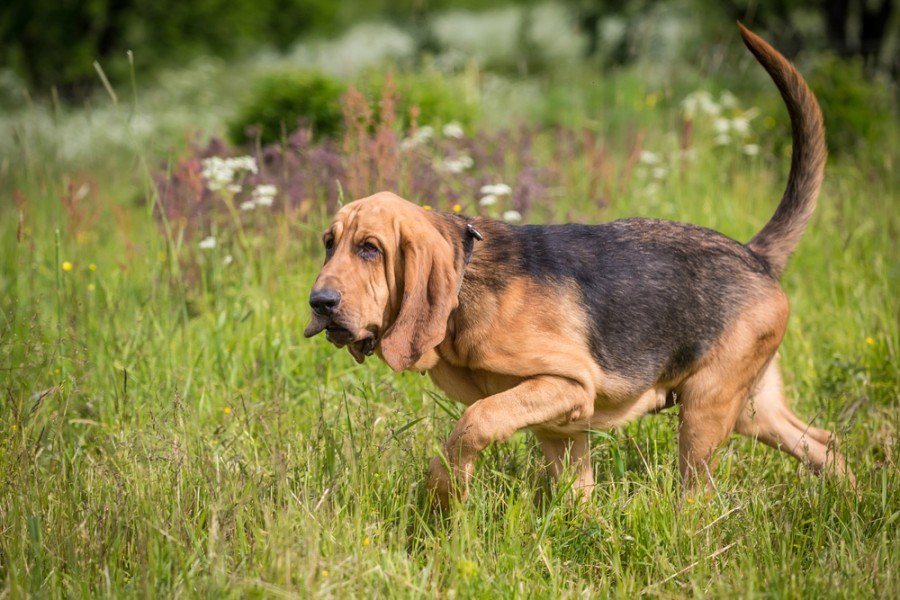
Which Breed Is Right for You?
Both Bloodhounds and Coonhounds have a lot in common. They are both working hunting dogs with a love of the outdoors and a need to experience the thrill of the hunt from time to time. Bloodhounds are larger than Coonhounds and require less intense exercise. Coonhounds are smaller and faster and require more intense exercise. Bloodhounds are better than Coonhounds for families, while Coonhounds would be great for active singles or young couples that can devote the time to them. The choice is ultimately up to you as to which dog fits your lifestyle the best.
Featured Image Credit: (T) Degtyaryov Andrey, Shutterstock | (B) Adithya_photography, Shutterstock

